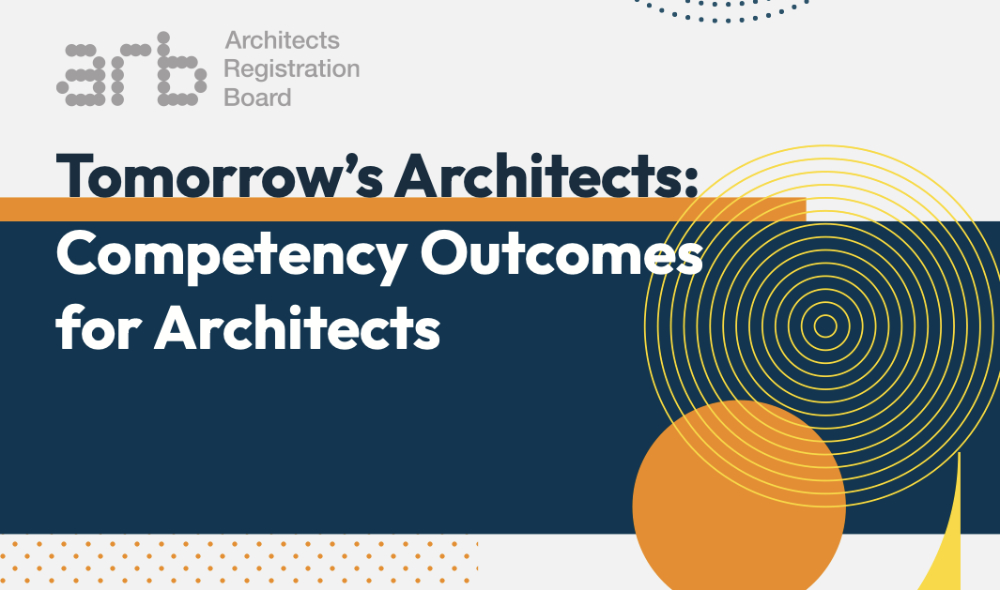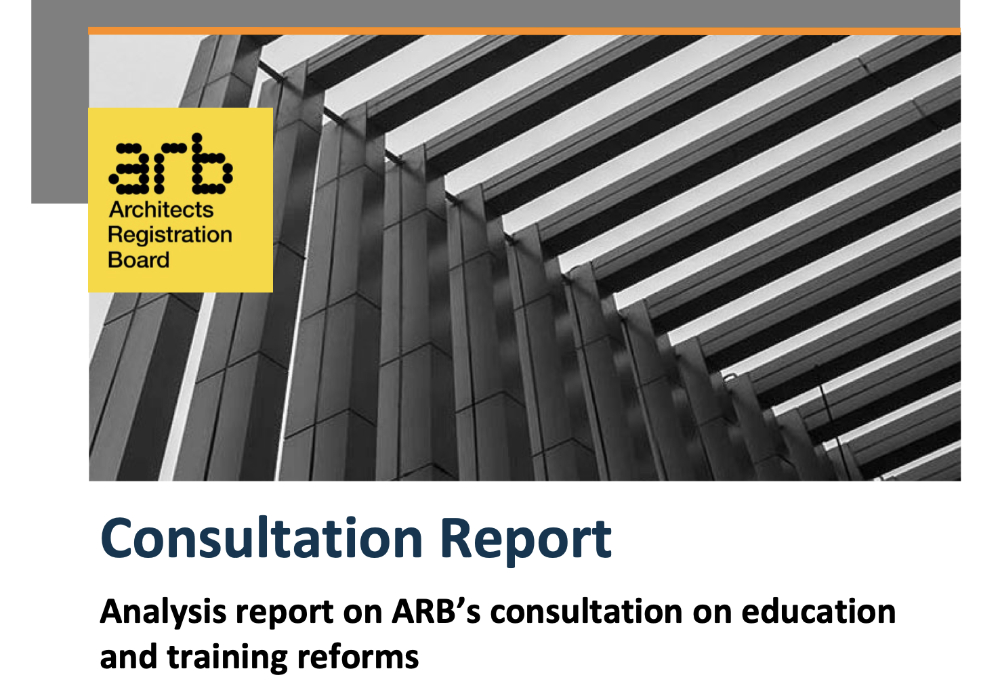ARB Tomorrow's Architects
Contents |
[edit] Consultation results and next steps
In February 2023, following over two years of research and development, ARB consulted on proposals for a new regulatory approach to how architects are trained and educated. The proposals aimed to modernise the competencies required of architects to face emerging and future challenges, including the climate emergency, and improve the flexibility and innovation for universities and other types of learning providers. It wanted to remove regulatory barriers and make our approach to quality assurance more proportionate, and create the flexibility for new routes to becoming an architect in the UK – having heard that the cost of education and the requirements for work experience create barriers for people from less affluent backgrounds or without existing networks in the profession.
The public consultation was open between February and May 2023. We received 672 responses that demonstrated a wide reach across different roles, regions and respondent characteristics. We read every response and analysed the key themes and trends. The Board discussed the analysis and considered the next steps alongside the aims of reforms and statutory remit, and made the following decisions:
- "We had the highest support for the competencies, so we are confident they accurately describe what future architects need to know, understand and be able to do. The new competencies are a major step-change from the criteria, a truly modern approach with a sharper focus on safety, climate change and inclusion. We’ll make some drafting amendments based on useful feedback, and publish the final versions this autumn.
- Our new approach to accreditation, including the standards for learning providers and transition timetable, also received support and useful ideas for improvement. We will publish the final version of the standards this autumn. We will establish a stakeholder group to give us agile feedback as the transition progresses.
- Important modifications will be made to the regulatory framework before we introduce it, to make sure it upholds standards whilst also removing bureaucracy and opening up the potential for new routes to joining the Register of Architects. Respondent views on the framework were mixed, but those who disagreed were not in alignment about an alternative. We will issue new guidance to learning providers about the appropriate learning and experience of those seeking to access the new Masters qualification. Our proposals do not negatively impact student access to funding.
- We will revise proposals for professional practical experience. We have learned through the consultation that removing the minimum duration will not address the problems that arise for those looking to gain the experience, and could have the unintended consequence of weakening the standards of the architects’ profession. We will consider short-term modifications like additional flexibility about the types of experience which are deemed relevant. We will appoint an independent Commission to develop new recommendations for the Board. We cannot solve all the problems with practical experience, but we want to take the lead in helping to improve access to it, and the experience of future architects. The Commission will help us identify how best to do that. It will run alongside our overall timetable and will not delay it."
[edit] Consultation on comprehensive reforms to the education and training of architects
On 8 February 2023, the Architects Registration Board launched a major public consultation on its plans for a new regulatory framework for educating and training architects. ARB’s comprehensive reforms would see the regulatory framework change from the current approach (Parts 1, 2 and 3) to require only two accredited qualifications. The reforms aim to support flexibility and widen access to the profession, whilst also enabling learning providers to innovate and maintain their global reputation for quality. This three-month consultation is a significant opportunity for architects, educators and students to review ARB’s proposals in detail and share their views.
ARB is the professional regulator responsible for setting the standards for registration as an architect. A fundamental part of this role is to set clear requirements for the outcomes of initial education and training, which in turn assure the public that all those on the Register of Architects are competent to practise.
Following two years of detailed policy development, including focus groups, surveys and events, ARB is now consulting on its new approach to the way architects are trained and educated. These innovative proposals aim to improve diversity and access to the profession, focusing on outcomes – what architects can do – rather than the learning process itself. ARB’s proposed framework focuses on flexibility; it is intended to be compatible with apprenticeships and other new routes that could emerge in the future, and will also break down barriers to multi-professional education and training. As well as redefining access to the profession for would-be architects, ARB’s work also includes providing ‘clearer and stronger’ standards for learning providers.
[edit] ARB’s proposals include
- New educational structure: The structure of architectural education and training will change from the current approach (Parts 1, 2 and 3) to require only two accredited qualifications. This flexible structure will open up new entry points and enable a range of pathways for future architects. It will be based on both Academic Outcomes (equivalent to Level 7) and Practice Outcomes (gained through professional practical experience).
- Modernised competencies: Qualifications will be focused on competency outcomes: based on what architects can do, not what they are taught. The competencies take a modern approach, based on research into how the profession and the world around it are changing.
- Standards: Clearer and stronger standards will be in place for universities and all learning providers delivering ARB-accredited qualifications.
- Quality assurance: ARB will introduce an evidence-based quality assurance of qualifications, overseen by a new Accreditation Committee.
[edit] Comments
Hugh Simpson, Chief Executive and Registrar of the Architects Registration Board
‘Our education and training proposals represent a landmark for the future of the profession – the first large-scale review in as much as five decades. Our new regulatory framework will enable new pathways to registration, offering a variety of flexible routes to anyone who wishes to bring their skills and talent to this respected profession. We urge architects, academics, students and anyone with an interest in architecture to respond to this consultation. Your input is a valuable contribution to creating a new high-quality educational model for the 21st century.’
Alex Wright, Professor and Head of Architecture, University of Bath
“I very much welcome the work that ARB is doing to create a new framework for architectural education and make new pathways to registration possible. I hope those in academia and practice take this opportunity to respond to the consultation to help shape ARB’s proposals. These are the most significant changes to architectural education for a generation, and this is our chance to ensure we have a flexible framework that facilitates innovation, and enables access to the profession for people from all backgrounds.”
Neal Shasore, Head of School and Chief Executive of the London School of Architecture
“The London School of Architecture was set up to support ‘Alternative Routes for Architecture’ – more affordable and accessible to all. ARB’s reforms have the potential to empower learning providers in training the next generation of leaders in our industry ever more responsively, and with equity and sustainability at the heart of our teaching. Whatever stage you are at on the path to becoming an architect, I encourage you to take part and have your say in this consultation.”
Harsha Gore, M.Arch student, and Co-Director at Decolonise Architecture
“Decolonise Architecture was established to embed inclusive behaviours and practices within architectural education and the profession. We hope the ARB’s proposals would help widen access to the profession, and we hope that behaviour, ethics, and diversity play a key role in the future of architectural professionalism. We’re keen for the new standards to encourage universities to broaden their learning and teaching resources to create a profession in which everyone is welcome, respected, and feels safe. We hope our fellow students respond to the consultation to help ARB’s reforms pave the way for a better, inclusive profession.”
[edit] Online consultation survey
ARB is encouraging anyone with an interest to complete the online consultation survey, which closes on Wednesday 10 May 2023. Once it has closed, ARB will analyse the responses and, based on the points raised, consider changes to the scheme. The Board will announce next steps by the autumn. Whilst the transition timelines are subject to consultation, it is ARB’s intention that anyone setting out to become an architect from September 2027 onwards will have to be trained and educated through the new, improved framework and assessed using the new learning outcomes.
[edit] Full details of proposals
Full details of the proposals, including all draft documents, are available on ARB’s website at:
- https://arb.org.uk/tomorrows-architects
- ARB has published additional documents to provide further information to those who wish to respond. These are, in chronological order:
- Review of architects competences
- Modernising architectural education and training
- ARB Education Survey Report June 2022
This article first appeared on the ARB website as "ARB launches Tomorrow’s Architects" dated February 8 2023.
[edit] Related articles on Designing Buildings
- ARB code of conduct.
- Architect.
- Architect's fees.
- Architects Registration Board ARB.
- Architectural design.
- Architectural education.
- Architectural education in a rapidly changing world.
- Architectural styles.
- Centres of excellence for architectural technology research and education.
- CIAT responds to the architects' regulation review.
- Concept architectural design.
- Metropolitan Architectural Consortium for Education.
- Professional indemnity insurance.
- Professional Qualifications Bill.
- Review of regulation of architects: call for evidence.
- RIBA.
- The Architects Act.
- The future of architectural education.
- The history of the architectural profession.
- What is a Chartered Practice?
Featured articles and news
CIOB and CORBON combine forces
To elevate professional standards in Nigeria’s construction industry.
Amendment to the GB Energy Bill welcomed by ECA
Move prevents nationally-owned energy company from investing in solar panels produced by modern slavery.
Gregor Harvie argues that AI is state-sanctioned theft of IP.
Heat pumps, vehicle chargers and heating appliances must be sold with smart functionality.
Experimental AI housing target help for councils
Experimental AI could help councils meet housing targets by digitising records.
New-style degrees set for reformed ARB accreditation
Following the ARB Tomorrow's Architects competency outcomes for Architects.
BSRIA Occupant Wellbeing survey BOW
Occupant satisfaction and wellbeing tool inc. physical environment, indoor facilities, functionality and accessibility.
Preserving, waterproofing and decorating buildings.
Many resources for visitors aswell as new features for members.
Using technology to empower communities
The Community data platform; capturing the DNA of a place and fostering participation, for better design.
Heat pump and wind turbine sound calculations for PDRs
MCS publish updated sound calculation standards for permitted development installations.
Homes England creates largest housing-led site in the North
Successful, 34 hectare land acquisition with the residential allocation now completed.
Scottish apprenticeship training proposals
General support although better accountability and transparency is sought.
The history of building regulations
A story of belated action in response to crisis.
Moisture, fire safety and emerging trends in living walls
How wet is your wall?
Current policy explained and newly published consultation by the UK and Welsh Governments.
British architecture 1919–39. Book review.
Conservation of listed prefabs in Moseley.
Energy industry calls for urgent reform.





























Comments
[edit] To make a comment about this article, click 'Add a comment' above. Separate your comments from any existing comments by inserting a horizontal line.